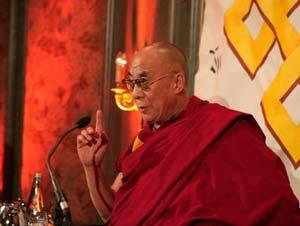Dalai Lama gathers Tibetan exiles for summit
Tibetan exiles have gathered in Dharamsala, India, the current home of the Dalai Lama, to try to decide how to proceed in its struggle against China over the status of Tibet.
For the past six years the Dalai Lama’s envoys have pressed for genuine autonomy for Tibetans; but Chinese officials refused to give concessions, and accuses the Tibetans of trying to split China. "The World’s" Mary Kay Magistad caught up with one of the main envoys in Dharamsala, to find out what direction exiled Tibetans will take now.
The Dalai Lama’s envoy, Kelsang Gyaltsen, wouldn’t say it was ever easy to negotiate with his Chinese counterparts on giving Tibet more autonomy; but up till last year, he says, the Chinese at least left the door open for future talks: "From 2007 on, it is noticeable that the Chinese side dictated their terms for a settlement."
Their terms included that the Dalai Lama must state publicly that Tibet has always been an integral part of China — something that Tibetans and independent historians say is patently false. Tibet fell under lose Chinese sway about 300 years ago, but was not directly ruled by Beijing until the Communist Party seized power and sent troops in to invade in 1950.
The Dailai Lama has said for 20 years that he recognizes that reality — that Tibet is now a part of China. But he’s been pushing for more autonomy for Tibetans to preserve Tibetan culture, something that is promised to ethnic minorities within the Chinese constitution.
Chinese negotiators asked the Dalai Lama’s envoys to come back with a detailed proposal of just what genuine autonomy would mean for them. In last month’s talks, according to Kelsang, Chinese negotiators saw Tibetan’s request to use their own language and preserve their monasteries as Tibet’s intent to separate from China: "So under such cases it’s hard to argue with your counterparts … if everything you say, everything you do, is seen as a hidden attempt at independence or separation."
PRI’s "The World" is a one-hour, weekday radio news magazine offering a mix of news, features, interviews, and music from around the globe. "The World" is a co-production of the BBC World Service, PRI and WGBH Boston.
